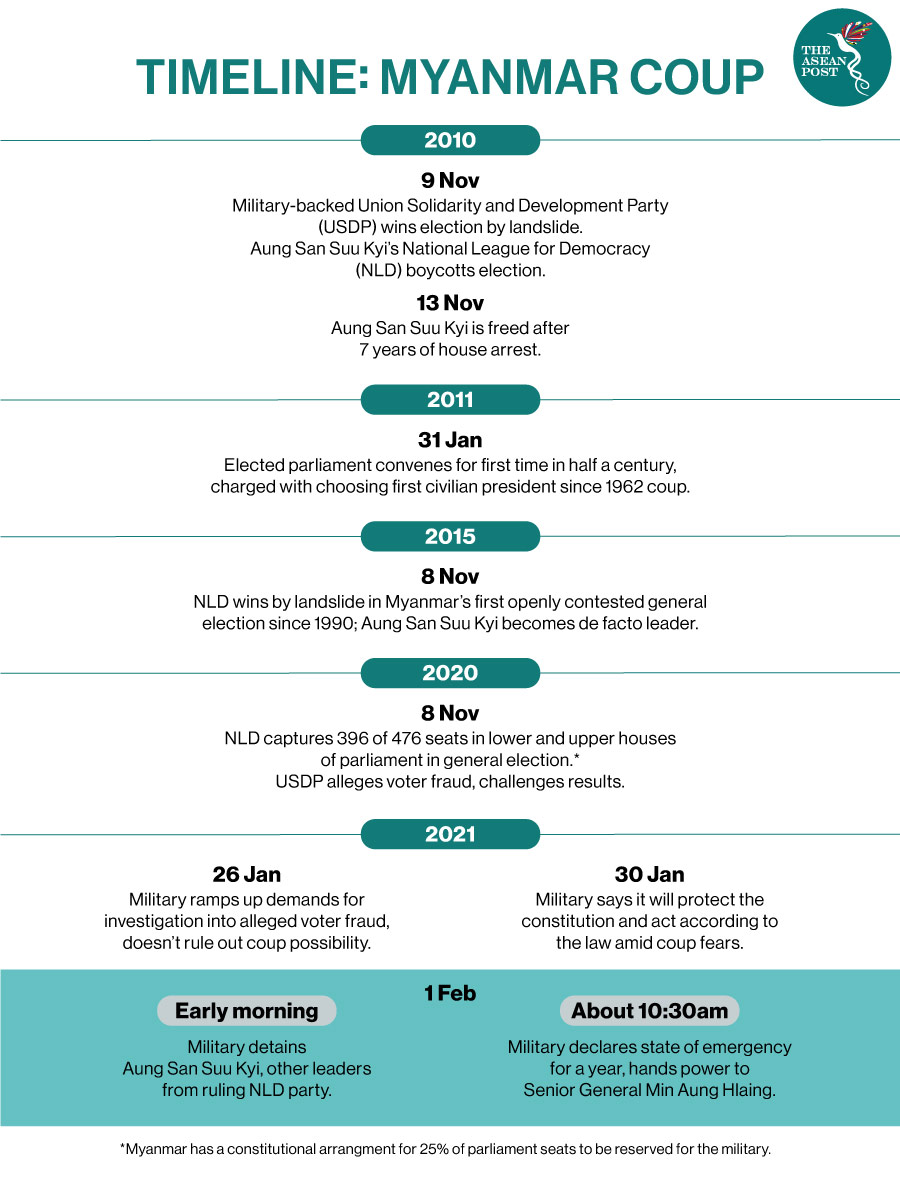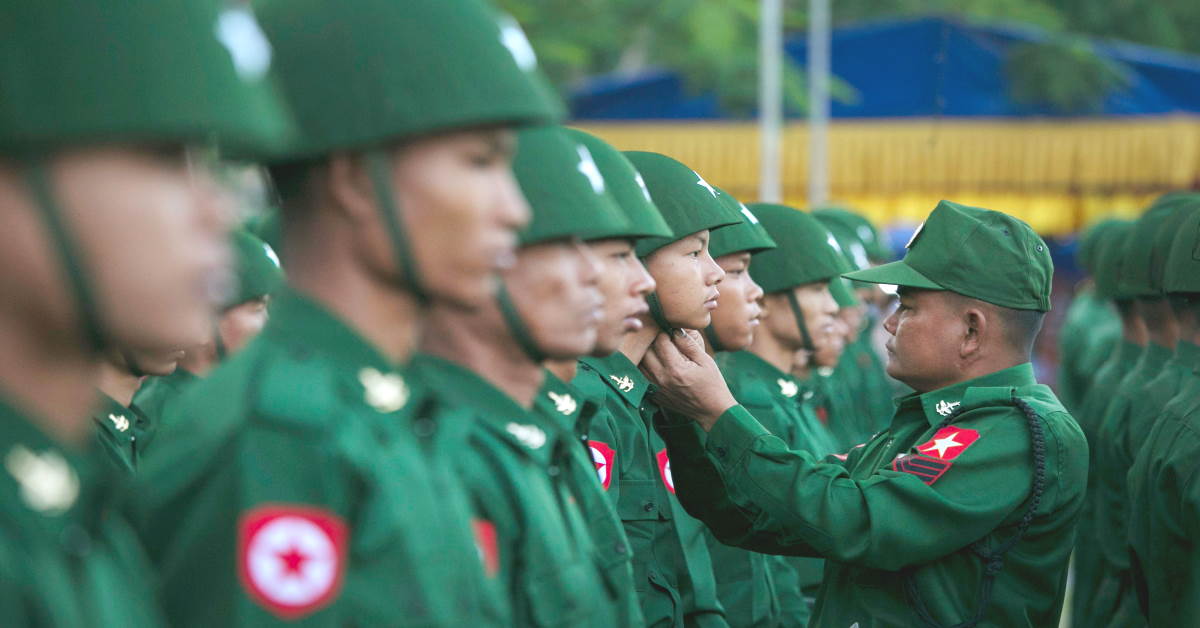Despite criticism of Myanmar’s recent electoral process – said to be an “apartheid election,” one that was “less free and fair than the last” – as stated by Burma Campaign United Kingdom, the ASEAN member state still went ahead with its second general elections on 8 November, 2020.
Even before the results were announced, widely admired civilian leader Aung San Suu Kyi’s National League for Democracy (NLD) was projected to be returned to power in the election. Several hundred supporters even ignored coronavirus warnings and gathered in a premature celebration, dancing, and waving flags outside the Yangon headquarters of the NLD following election day.
As expected, the NLD party clinched a second consecutive landslide win in the national elections, with the party gaining 396 of the 476 available seats in the parliament.
This was immediately met with voter fraud allegations by Myanmar’s military, the Tatmadaw. The civilian administration has been in an uneasy power-sharing agreement with the army generals since Myanmar’s first democratic elections in 2015, as dictated by a 2008 junta-authored constitution.
The country’s military holds huge power in the country, retaining control of three key ministries and a quarter of all parliamentary seats.
Min Aung Hlaing, Myanmar’s military chief, and perhaps the kingdom’s most powerful individual, said last week that the country’s constitution was “the mother law for all laws.” However, he warned that in certain circumstances, it could be “necessary to revoke the constitution.”
The military is alleging 10 million cases of voter irregularities and demanded for Myanmar’s election commission to release final voter lists from the November polls for cross-checking. But neither the military nor its affiliated Union Solidarity and Development Party (USDP), which fared poorly in the elections, have presented any proof of actual voter fraud.
Local media reported that Myanmar’s election authorities last Thursday rejected the military’s claims and issued a statement on the Union Election Commission (UEC) Facebook page, explaining that the “election was conducted transparently and devoid of fraud with no significant errors that would affect the credibility of the vote.”
But the UEC admitted that it has seen “weaknesses” in voter lists in previous elections. "There cannot be a situation of voter fraud just because of weaknesses in flawed voter lists in this election," it said.
Military Coup
Yesterday, Myanmar and the rest of Southeast Asia woke up to shocking news – the detainment of the kingdom’s senior politicians including Suu Kyi, and a coup by the country’s military. It said that the detentions were in response to fraud concerns in the November general elections.
The takeover was announced in a statement aired on a military-owned television station. It was also stated that the top army commander was in charge and a one-year state of emergency had been declared. This comes just when Myanmar’s new parliamentary session was to begin, following days of fears that a coup was coming.
The takeover was a sharp reversal of the progress towards democracy in Myanmar after five decades of military rule. It was reported that Myint Swe, a former general who ran the powerful Yangon military command and the current vice president of Myanmar, will become acting president for the next year.
Myanmar’s military also added that it will hold fresh elections and hand power to the winning party after the 12 months of Emergency have elapsed.
“We will perform real multi-party democracy... with complete balance and fairness,” a statement on the army’s official Facebook page said.
On another Facebook post, the NLD published a statement on behalf of Suu Kyi, which has not been seen in public since she was arrested, asking the “people not to accept this, to respond and wholeheartedly to protest against the coup by the military.”
“The actions of the military are actions to put the country back under a dictatorship,” said the statement.

Responses
The seize of power by the Tatmadaw has been highly criticised by rights groups and other nations, with many observers demanding the release of Suu Kyi, and other arrested officials.
Joe Biden, the new United States (US) President said that the military takeover and detention of civilian leaders is “a direct assault on the country’s transition to democracy and the rule of law.”
Echoing his sentiment, European Council President Charles Michel, in a tweet, condemned the coup and demanded that it release all those who had been detained in raids across the country.
Whereas ASEAN, in a statement said that it was time to, “recall the purposes and the principles enshrined in the ASEAN Charter, including, the adherence to the principles of democracy, the rule of law and good governance, respect for and protection of human rights and fundamental freedoms.”
“We encourage the pursuance of dialogue, reconciliation and the return to normalcy in accordance with the will and interests of the people of Myanmar,” it stated.
Brad Adams, Asia director at the Human Rights Watch (HRW), also expressed concern for the safety and security of Myanmar’s activists and critics of the military who may have been taken into custody.
However, Rohingya Muslims in crowded refugee camps who fled Myanmar for Bangladesh after a brutal military crackdown a few years ago, celebrated Suu Kyi’s detention.
“She is the reason behind all of our suffering. Why shouldn’t we celebrate?” community leader Farid Ullah told the media at Kutupalong – the world’s largest refugee settlement.
“She was our last hope, but she ignored our plight and supported the genocide against the Rohingya,” said Mohammad Yusuf, a leader at the neighbouring Balukhali camp.
Suu Kyi has drawn criticism over the past few years from several countries and organisations over Myanmar’s inaction in response to the violence against the Rohingya people in Rakhine State, and her refusal to accept that Myanmar’s military had committed acts of genocide.
Related Articles:
